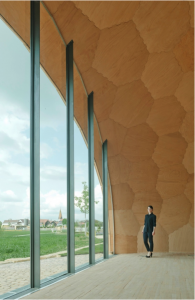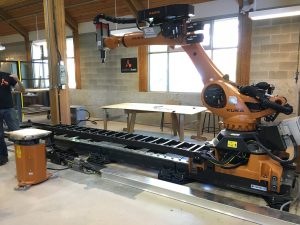Date: September 17th – 19th, 2016 (plus optional 2 days)
Location: Centre for Advanced Wood Processing, Vancouver, BC
 Research Associates, David Correa and Oliver David Krieg, of the Institute for Computational Design (ICD) will hold a technical workshop on robotic fabrication at the Centre for Advanced Wood Processing (CAWP) of the University of British Columbia (UBC), Vancouver. While many industries have made leaps and bounds in adopting highly flexible and fully automated fabrication workflows using robotics, the construction and design industry are only just starting to open the door to these technologies. Recent developments in robotics combined with more accessible design-to-fabrication tools can now offer architects, designers and fabricators unprecedented access to a new design paradigm.
Research Associates, David Correa and Oliver David Krieg, of the Institute for Computational Design (ICD) will hold a technical workshop on robotic fabrication at the Centre for Advanced Wood Processing (CAWP) of the University of British Columbia (UBC), Vancouver. While many industries have made leaps and bounds in adopting highly flexible and fully automated fabrication workflows using robotics, the construction and design industry are only just starting to open the door to these technologies. Recent developments in robotics combined with more accessible design-to-fabrication tools can now offer architects, designers and fabricators unprecedented access to a new design paradigm. The Workshop:
ICD at the University of Stuttgart is world-renowned for its leading research expertise in robot-assisted design and fabrication. CAWP and the School of Architecture and Landscape Architecture at UBC is pleased to bring ICD to Canada to offer this one-of-a-kind opportunity to participate in a hands-on workshop on Robotic Fabrication. Using a state-of-the-art eight-axis industrial robot configuration, the workshop will guide participants through the unique technical and conceptual foundations that underpin robotic milling in wood through the development and construction of a full-scale fabrication project.
The workshop is structured as two full days of intensive training with the robot, followed by a hands-on fabrication session the following week:
- Robot Training (2 days): The two full-day training sessions will cover an introduction to the computational tools, robot operation and safety procedures.
- Fabrication/Prototyping (1 core day, with optional attendance on two subsequent days): Participants will take control of the robot and assist in the making of an architectural prototype made from large timber elements. Participants will directly engage in the fabrication process by starting with a base geometry, generating a buildable structure using computational design tools and the machine’s constraints.

The Prototype:
By using advanced timber fabrication techniques and taking full advantage of the extended fabrication range of the multi-axis set up, large sections of plywood will be custom milled and assembled into a unique one-to-one scale architectural prototype. The prototype will showcase distinctive wood fabrication possibilities that integrate computational design, material characteristics, and digital fabrication in a direct design to production paradigm.
For more information please contact cawp@cawp.ubc.ca